|
|
|
Sort Order |
|
|
|
Items / Page
|
|
|
|
|
|
|
| Srl | Item |
| 1 |
ID:
119950
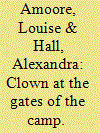

|
|
|
|
|
| Publication |
2013.
|
| Summary/Abstract |
This article considers the figure of the clown-fool as a way of approaching anew contemporary practices of sovereignty and resistance. The spectre of the camp as the nomos of modern sovereign power is widely critiqued for its neglect of the thriving and teeming life that actually accompanies the declaration of exception. The clown is an errant and troublesome figure whose life haunts the sovereign decision on exception. His presence in border-camp activism invokes a rich, provocative history in which the clown's foolish wisdom has critiqued the conceits of power. Yet, the clown's significance exceeds his traditional associations with carnivalesque misrule and mockery. Like homo sacer, the clown occupies an ambiguous position between political inclusion and exclusion, between inside and outside. In short, the sovereign needs the clown. His relation to resistance is thus also complex. The clown does not turn to face a locus of power as though it could be countered or overturned. Rather, he is the example par excellence of the resistance always already present within the exercise of power: standing not inside or outside the gates, but looking through, he dwells within the court but is not of its making. As a singularity akin to Deleuze's figurative children and Agamben's tricksters, the clown troubles the division between interior and exterior on which sovereign political life rests, a division that is also frequently replicated in understandings of resistance.
|
|
|
|
|
|
|
|
|
|
|
|
|
|
|
|
| 2 |
ID:
019408
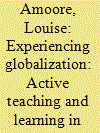

|
|
|
|
|
| Publication |
Feb 2001.
|
| Description |
15-32
|
|
|
|
|
|
|
|
|
|
|
|
|
|
|
|
| 3 |
ID:
049877


|
|
|
|
|
| Publication |
Manchester, Manchester University Press, 2002.
|
| Description |
xi, 193p.
|
| Standard Number |
0719060966
|
|
|
|
|
|
|
|
|
|
|
|
Copies: C:1/I:0,R:0,Q:0
Circulation
| Accession# | Call# | Current Location | Status | Policy | Location |
| 046442 | 337/AMO 046442 | Main | On Shelf | General | |
|
|
|
|
| 4 |
ID:
193296
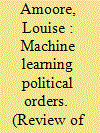

|
|
|
|
|
| Summary/Abstract |
A significant set of epistemic and political transformations are taking place as states and societies begin to understand themselves and their problems through the paradigm of deep neural network algorithms. A machine learning political order does not merely change the political technologies of governance, but is itself a reordering of politics, of what the political can be. When algorithmic systems reduce the pluridimensionality of politics to the output of a model, they simultaneously foreclose the potential for other political claims to be made and alternative political projects to be built. More than this foreclosure, a machine learning political order actively profits and learns from the fracturing of communities and the destabilising of democratic rights. The transformation from rules-based algorithms to deep learning models has paralleled the undoing of rules-based social and international orders – from the use of machine learning in the campaigns of the UK EU referendum, to the trialling of algorithmic immigration and welfare systems, and the use of deep learning in the COVID-19 pandemic – with political problems becoming reconfigured as machine learning problems. Machine learning political orders decouple their attributes, features and clusters from underlying social values, no longer tethered to notions of good governance or a good society, but searching instead for the optimal function of abstract representations of data.
|
|
|
|
|
|
|
|
|
|
|
|
|
|
|
|
| 5 |
ID:
151188
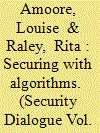

|
|
|
|
|
| Summary/Abstract |
Amid the deployment of algorithmic techniques for security – from the gathering of intelligence data to the proliferation of smart borders and predictive policing – what are the political and ethical stakes involved in securing with algorithms? Taking seriously the generative and world-making capacities of contemporary algorithms, this special issue draws attention to the embodied actions of algorithms as they extend cognition, agency and responsibility beyond the conventional sites of the human, the state and sovereignty. Though focusing on different modes of algorithmic security, each of the contributions to the special issue shares a concern with what it means to claim security on the terrain of incalculable and uncertain futures. To secure with algorithms is to reorient the embodied relation to uncertainty, so that human and non-human cognitive beings experimentally generate and learn what to bring to the surface of attention for a security action.
|
|
|
|
|
|
|
|
|
|
|
|
|
|
|
|
| 6 |
ID:
130991
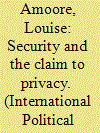

|
|
|
|
|
| Publication |
2014.
|
| Summary/Abstract |
When US President Barack Obama publicly addressed the data mining and analysis activities of the National Security Agency (NSA), he appealed to a familiar sense of the weighing of the countervailing forces of security and privacy. "The people at the NSA don't have an interest in doing anything other than making sure that where we can prevent a terrorist attack, where we can get information ahead of time, we can carry out that critical task," he stated. "Others may have different ideas," he suggested, about the balance between "the information we can get" and the "encroachments on privacy" that might be incurred (Obama 2013). In many ways, conventional calculations of security weigh the probability and likelihood of a future threat on the basis of information gathered on a distribution of events in the past. Obama's sense of a trading-off of security and privacy shares this sense of a calculation of the tolerance for the gathering of data on past events in order to prevent threats in the future. In fact, though, the very NSA programs he is addressing precisely confound the weighing of probable threat, and the conventions of security and privacy that adhere to strict probabilistic reasoning. The contemporary mining and analysis of data for security purposes invites novel forms of inferential reasoning such that even the least probable elements can be incorporated and acted upon. I have elsewhere described these elements of possible associations, links, and threats as "data derivatives" (Amoore 2011) that are decoupled from underlying values and do not meaningfully belong to an identifiable subject. The analysis of data derivatives for security poses significant difficulties for the idea of a data subject with a recognizable body of rights to privacy, to liberty, and to justice.
Consider, for example, two years before the controversies surrounding NSA and the PRISM program, when the US Director of National Intelligence, James Clapper, testified before the joint hearing of committees on the virtues of the algorithmic piecing together of fragments of data:
|
|
|
|
|
|
|
|
|
|
|
|
|
|
|
|
| 7 |
ID:
134473
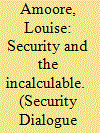

|
|
|
|
|
| Summary/Abstract |
In this article, I explore a specific relation between mathematics and security calculations. Recalling the confrontations between the mathematician Alan Turing and the philosopher Ludwig Wittgenstein in the 1930s, I am interested in the relationship between intuition and ingenuity. During Wittgenstein’s 1930 lectures on the foundations of mathematics, Turing interjects in order to insist upon the capacity of number: ‘one can make predictions’. Wittgenstein replies that mathematics ‘makes no predictions’, but instead is a form of grammar: ‘taken by itself we shouldn’t know what to do with it; it’s useless. But there is all kind of use for it as part of a calculus’. It is just such a formulation of a calculus or grammar – ‘decision trees’, ‘event trees’, ‘attribute-based algorithms’ – that characterizes contemporary security. As for Turing, the logic comprises ‘two faculties, which we may call intuition and ingenuity’. The intuitive realm of imagination and speculation reaches toward a possible solution, while the ingenuity seeks arrangements of propositions. The advent of ‘rules-based’ and ‘risk-based’ security decisions, then, are always already political because they precisely involve combinatorial possibilities whose arrangement has effects in the world.
|
|
|
|
|
|
|
|
|
|
|
|
|
|
|
|
| 8 |
ID:
077353


|
|
|
|
|
| Publication |
2007.
|
| Summary/Abstract |
This article engages with a form of visual culture that is, W. J. T. Mitchell (2002: 170) reminds us, `not limited to the study of images and media', but extends also `to everyday practices of seeing and showing'. In the spirit of this openness to multiple manifestations of the domain of the visual and visual practices, the article explores how a particular mode of vigilant or watchful visuality has come to be mobilized in the `homefront' of the so-called war on terror. In homeland security programmes from border and financial screening to Highway Watch, how has sight become represented as the sovereign sense on the basis of which security decisions can be taken? Taking its illustrative cue from Paul Haggis's film Crash, and from a body of work that conceives of touch as `integral to' seeing, the article asks how we might subvert watchful politics by seeing seeing differently.
|
|
|
|
|
|
|
|
|
|
|
|
|
|
|
|
|
|
|
|
|